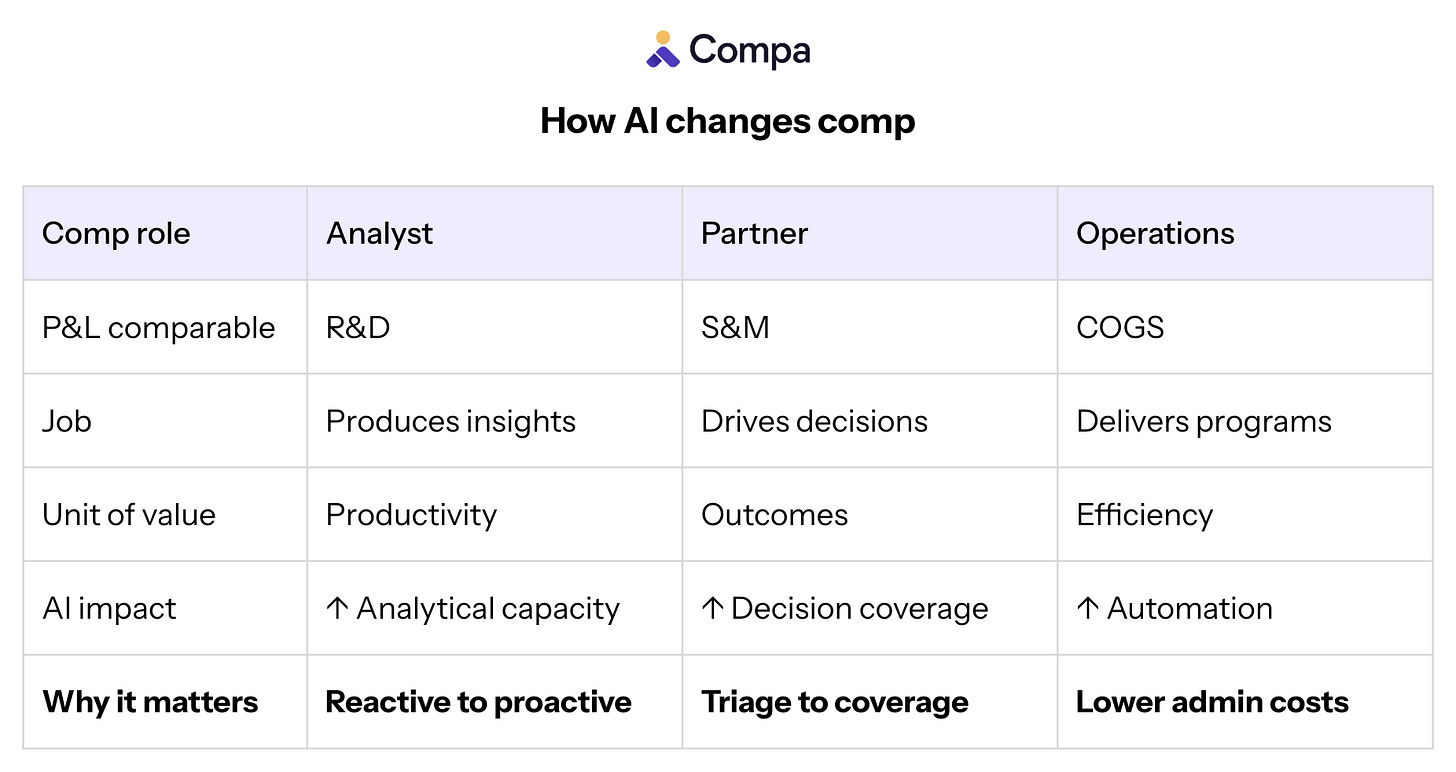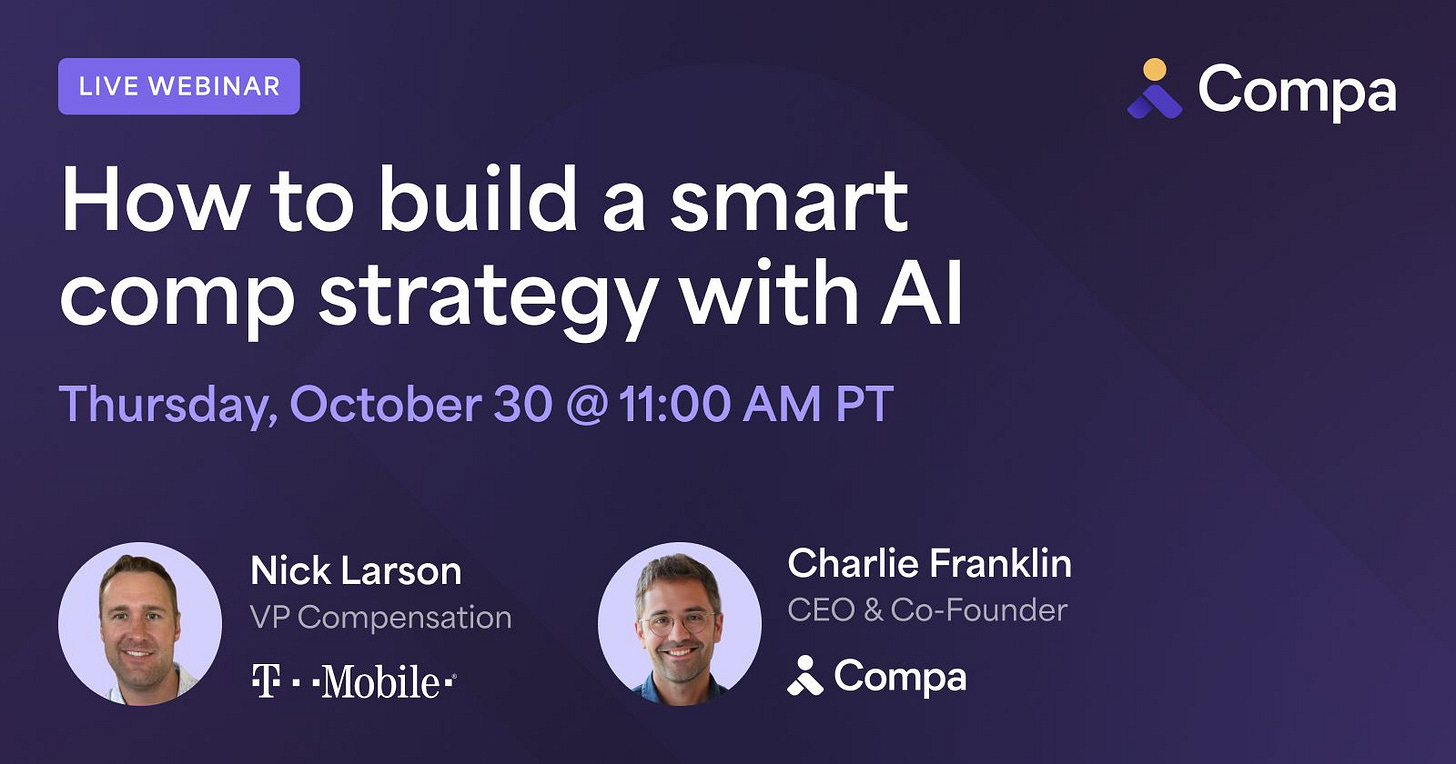How AI agents are changing comp
Viewing comp jobs like a P&L reveals the discrete impacts

Every comp team has three archetypal roles: analyst, partner, and operations. And AI is impacting each of them.
Some teams literally organize jobs like this, others are blended together; regardless, the underlying work ultimately fits these building blocks.
I think of each role like a part of the P&L driving the comp portfolio (“top line”):
Analyst → R&D: produces insights
Partner → S&M: brings insights to the business
Operations → COGS: delivers programs
(And leadership is the equivalent of G&A)
The P&L metaphor is useful to understand the unit of value each comp role provides:
Analyst → Productivity: how much high-quality insight can you produce?
Partner → Outcomes: how many strategy-aligned decisions can you manage?
Operations → Efficiency: how can you deliver the best service at the lowest cost?
The units of value for each role reveal how AI is changing work in compensation.
Analyst
Compensation Analysts work with lots of data to shape insights, synthesizing inputs like cost, competitiveness, fairness, and performance. Their insights, in turn, are used to guide strategy, set policy, and identify risk.
If Analysts are like an engineering team, then the successful Analysts are more productive — and that’s how AI is changing their work.
AI massively expands analytical capacity. Faster analysis with more data and more complexity to produce more insights. Manual spreadsheets move to automated analysis. Old surveys move to connected, real-time data. VLOOKUPs become agentic prompts and playbooks.

What makes AI exciting for Comp Analysts is that the analytical expansion isn’t incremental, but an order of magnitude — they can finally achieve escape velocity, slip beyond the event horizon, and shift from reactive to proactive, sourcing compensation insights automatically, instead of only inbound problems originating from the business.
Partner
Compensation Partners apply strategy to the business to get smart decisions made. They are the interface between the compensation team and leaders in engineering, GTM, the new business unit, APAC, and so on.
If Comp Partners are like a sales team, then successful Partners get bigger better outcomes — and again, that’s how AI is changing their work.
AI massively expands compensation coverage. Emails, phone calls, and meetings become a low-latency agentic chat interface. Broad salary ranges become highly-curated recommendations at scale. Exceptions and accidental “acts of cash” are eliminated or managed by automated, dynamic rules and goal-seeking.
The big change for Partners is a shift from triage to coverage — more pay decisions touch comp and get smarter, driving more strategy-aligned outcomes and less mess.
Operations
Operational comp roles deliver programs, manage technology and systems, and maintain compliance.
Like a support team, it’s all about delivering programs smoothly at minimum cost and effort — and AI has an important impact here, too.
AI massively improves operational efficiency. This benefit is well-known in support-heavy company functions like customer service and help desks, and it applies to Operations roles on compensation teams, too. Delivering comp planning, answering program questions, and completing high-volume tasks get automated with AI.
So the big gain for Operations is lower administrative costs.
While operational efficiency is always important, comp teams are not large and expensive like major operational teams in the company; efficiency will improve with AI, but I see the bigger impact in compensation with Analysts and Partners, where intelligence dramatically expands to achieve smarter outcomes on the company’s largest investment — its people.
What should comp teams do?
Short answer — begin experimenting.
If you haven’t already, you’re behind. Many, many comp teams are implementing AI capabilities to gain competitive advantage. And as one leader told me last week, real-time data and agents will shift from a competitive edge to handicapped if not deployed in the next 12 months.
Another place to start — later today I’m talking with Nick Larson at T-Mobile about using AI in compensation. Join us live to learn and ask questions about how this phenomenal comp team is innovating with AI.

On a final personal note, I’m back from a writing break since my third child was born in August. Thank you kind readers your patience while I balance Compa and my growing family.
Lots of market trends to discuss, and exciting news coming soon. I’m glad to be back!
Peer Group is a newsletter for comp leaders navigating fast-moving markets and AI transformation! If you want to share my newsletter, you can forward this email to your colleagues and fellow comp leaders.
Want more polls and insights about the latest thinking in comp?
Subscribe by hitting the button below.

Thank you for this article—it’s the most concise breakdown of how AI is transforming the three core compensation roles I’ve seen. I’d argue that the profile distinctions you’ve outlined (Analyst, Partner, Operations) are relevant across all HR functions, not just compensation.
From my anecdotal experience, tools like Copilot are already helping analysts surface insights faster. However, I think the hesitancy around adopting more advanced agentic automation is what’s currently holding back the kind of order-of-magnitude acceleration you describe. The potential is clearly there, but the implementation gap remains real.